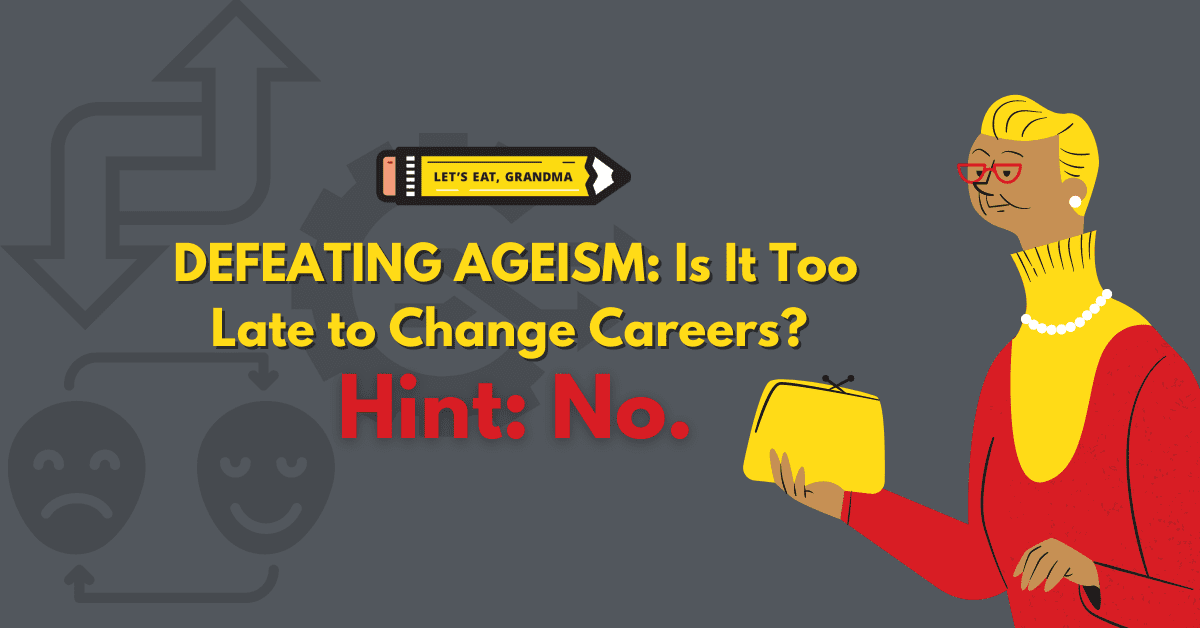Defeating Ageism, Part 4: Am I Too Old to Change Career Paths? (Hint: No)

It’s never too late to change careers! Here’s everything you need to prepare you to take the plunge.
By: Jennifer Meehan | Contributor for Let’s Eat, Grandma
This is the fourth and final part of our Defeating Ageism series. You can find Part 1 here, Part 2 here, and Part 3 here.
Changing career paths is a challenge for anyone, but it’s even more intimidating if your age is a factor. A survey by AARP found that 76 percent of older workers see “age discrimination as a hurdle to finding a new job.” One can only assume how much higher that percentage is if that new job is in a new career path!
But it doesn’t have to be that way. If you are in your 40s or 50s, there is no reason why you should stay in a stagnant job you no longer love. It’s perfectly possible to find fulfilling work in a new career path, so long as you have the right tools.
For inspiration, consider that Vera Wang didn’t start designing until age 40 and Laura Ingalls Wilder, author of Little House on the Prairie, didn’t publish a novel until age 65!
Want more job search tips? Sign up for our newsletter!
Work With What You’ve Got

Older career changers have lots of expertise to share in their new field. Photo by Scott Graham on Unsplash
Ambika Nigam, a career-change consultant and founder of Zeit, says the first thing you have to do is recognize that it’s not too late. “What you bring to the table is experience and expertise,” she advises. “The key is to know how to strategically position that expertise.”
Nigam recommends that you consider the following when building a career change strategy:
“Can you bring specific domain or industry experience to a new job?”
No matter what your past career path was in, it gave you domain experience. Say you have been working in educational publishing for the last 10 years and you yearn never to see another standardized test in your life. You clearly have the hugely translatable skills of writing and editing.
But think about the rest of your job. Most likely, dealing with state departments of education and cranky authors has given you tenacity and tact. You have no doubt managed several projects at once and you have mastered enormous databases and Excel. That expertise could easily help you get a job in Customer Success, Public Relations or Business Development.
“How can an emerging startup or company benefit from your expertise, and in what way? How can that be your angle?”
To use the same educational publishing example, a young startup would probably need your expertise in dealing with bureaucracy and regulation so the creative types don’t have to worry about it. Your years of negotiating contracts, schedules and deadlines would also benefit a new company, not to mention your maturity. Even Facebook had to hire a “Responsible Adult.”
“Perhaps you have been with the same company or industry for many years but reinvented yourself in many ways. Share the stories of how you’ve done this in the context of the new opportunity.”
Even though you’ve been working for that publisher for 10 years, you may have taken up different pursuits on your own time. You have become a volunteer literacy instructor or a teacher of English as a second language. You have discovered a love of music and have learned the viola. These examples are valuable evidence of your active mind and your ability to learn new things. When you’re interviewing with someone half your age, it’ll prove that you’re not yet a doddering old fool.
On another note, our partner Lisa Lewis-Miller, host of the Career Clarity Show podcast, author, and founder of Career Clarity, counsels job seekers to differentiate skills from strengths. A skill is something you do well; a strength is something that energizes and motivates you. As you look for a new career, think about what you enjoy and what interests you, not just your transferable skills.
Certification and Upskilling

Coding is a useful skill for job seekers of any age. Photo by Nubelson Fernandes on Unsplash
Although you can and should emphasize your experience, a professional certification can make you more marketable, especially when you’re of “a certain age.” Technology has raced along so fast over the past few years that people of all ages have trouble keeping up.
To prove you have advanced computer skills, despite your advanced age, you could get professionally certified in data analysis, for example, or even take a coding class. There’s no reason you can’t learn to code as well as a 23-year-old.
Other certifications to consider are in Excel and Adobe Creative Cloud. Everyone thinks they can do Excel, but to really take advantage of it you need to go beyond the basics. An Excel expert will always be worth a second look.
Adobe’s design programs debuted 20 years ago. You may have learned Photoshop and InDesign years ago, so getting certified in the latest versions can get you noticed along with the youngsters.
Upskilling means learning new and advanced skills. There are probably thousands more job roles now than when you first started working, and more are created every day. To remain relevant, you have to get proficient in the skills needed for the career you’re considering.
Plus, you may already have some of the skills required for these new jobs and just need to fill out your skillset. As Nigam says, “[Roles like] Customer Success, Content Strategy, and Community Manager are about 5-7 years old, though they have existed in different forms. Content Strategy has evolved from roles like Copywriting, User Research, and Product Design.”
According to Forbes, remote work is probably here to stay. Especially as the job market improves, you will need to learn not just new skills, but a whole new way of working, whether you’re 55 or 25.
Celebrate your maturity! That accumulation of knowledge and work skills is way more important than the date on your birth certificate. We hope our series on ageism has given you some ideas on how to advance your career with confidence, but if you’re having trouble identifying which of your many career accomplishments to highlight on your resume and cover letter, why not let one of our experienced resume writers help you out!
Want more job search tips sent straight to your inbox? Sign up for our newsletter here:
Better Resume.
Satisfying Career.
Happier You.
